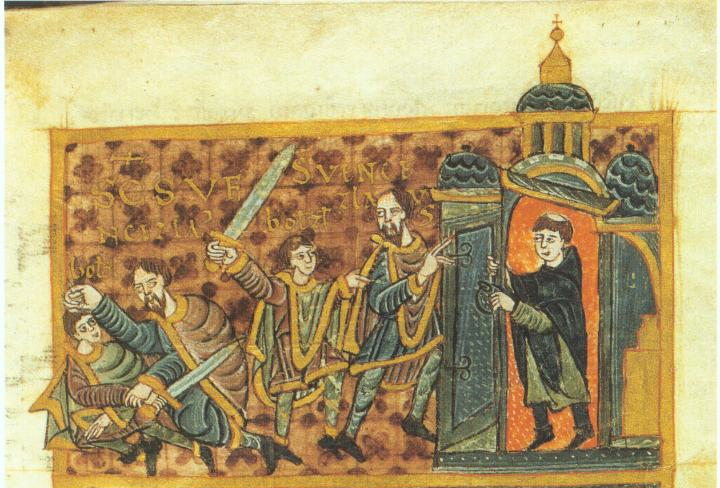[featured-image single_newwindow=”false”]
This Sunday (Sept. 28th) we celebrate the feast day of Saint Wenceslaus, Duke of Bohemia. Even though Wenceslaus was a nobleman of a neighboring kingdom, he has still been considered one of the several patron saints of Poland for many centuries. In fact, the veneration of Saint Wenceslaus in Poland is most likely due to the close proximity of Bohemia. His cult grew quickly in southern Poland and is most evident in one of the most important cathedrals in all of Poland.
Saint Wenceslaus (Wacław) is co-patron of the Wawel Cathredal, alongside Saint Stanislaus, who is buried in the cathedral. The full title of the Kraków cathedral (where St. John Paul II was ordained a priest, said his first Mass and consecrated a bishop) is The Royal Archcathedral Basilica of Saints Stanislaus and Wenceslaus on the Wawel Hill (królewska bazylika archikatedralna śś. Stanisława i Wacława na Wawelu). It has also been the site of numerous coronations of Polish kings (hence the elaborate name).
St. John Paul II, as Archbishop of Kraków, remarked during a homily that the two patrons of the cathedral embraced the entire Slavic people:
Our Mother, the Church gave to this temple…two patrons…This cathedral is not only a great shrine of our Polish history, but…a shrine of the Slavic world, of all Slavic peoples…By the tomb of St. Stanislaw and the relics of St.Wacław…we begin the days during which we will sing and speak, pray and meditate, on what it means to build the Church. (The Making of the Pope of the Millennium, 483.)
Who Was “Good King” Wenceslaus?
Technically, Wenceslaus was never “king” in his lifetime. His official title was “Duke of Bohemia” and was viewed as a just ruler, who did what he could to take care of his people. A common legend that may have been inspired by his life, relates how Wenceslaus would go out every night to give alms to the poor. Cosmas of Prague in 1119 writes:
“But his deeds I think you know better than I could tell you; for, as is read in his Passion, no one doubts that, rising every night from his noble bed, with bare feet and only one chamberlain, he went around to God’s churches and gave alms generously to widows, orphans, those in prison and afflicted by every difficulty, so much so that he was considered, not a prince, but the father of all the wretched” (Book I of the Chronica Boëmorum, emphasis added).
This is where the popular hymn, “Good King Wenceslaus,” gets its origin. Additionally, the Duke St. Wenceslaus, was posthumously given the title of “King” by Holy Roman Emperor Otto I.
Murdered by his own brother
Wenceslaus was brought up by his grandmother Saint Ludmilla, who took him in after his father’s death and raised him in the Catholic faith. Christianity was still very new in Bohemia and it is believed that Wenceslaus’ great-grandfather was converted by Sts. Cyril and Methodius. Additionally, Wenceslaus’ own mother Dragomir was opposed to Christianity and conspired with her son Boleslaw to recapture the throne.
They accomplished what they desired by luring Wenceslaus to celebrate the feast of Sts. Cosmas and Damian in Stará Boleslav. Three of Boleslaw’s companions then murdered Wenceslaus on the way to Mass. Boleslaw then succeeded his brother as Duke of Bohemia, but three years later repented of his deeds. Quickly after Wenceslaus’ death the people of Bohemia venerated him as a saint and martyr and Boleslaw ordered that his body be moved to the cathedral of St. Vitus in Prague.
Saint Wenceslaus is a great example of a just ruler, who cared for his people and died because of his strong Christian beliefs. He is a great intercessor today for a world where Christian politicians are constantly under attack.
And just for fun, here is Bing Crosby singing the famous Christmas Carol “Good King Wenceslaus:”
http://youtu.be/p3pcIKNttLU

